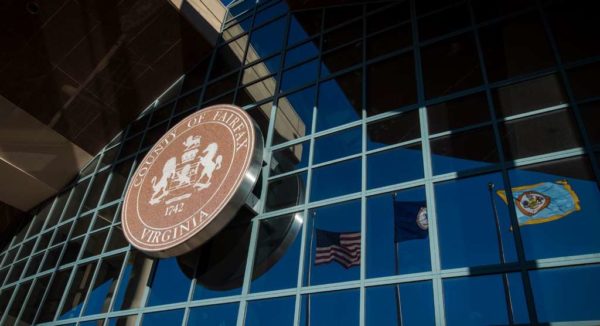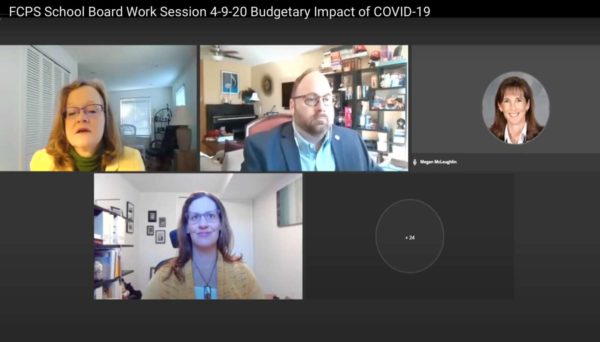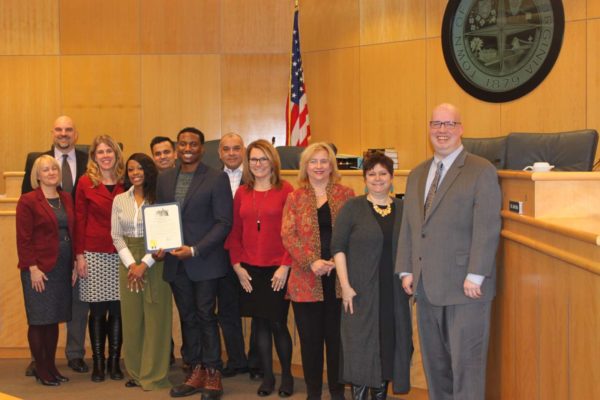Fairfax County will receive an additional $34 million to provide emergency rental assistance to residents experiencing economic challenges due to the COVID-19 pandemic.
During a budget policy committee meeting yesterday (Tuesday), Fairfax County Department of Management and Budget Director Christina Jackson told the county board of supervisors that the department has submitted a certification for the award, and the amount is expected to be confirmed today.
The money comes from a $25 billion emergency rental assistance program that the U.S. Treasury Department established using funds from the COVID-19 relief package that Congress passed at the end of December.
“This will be huge,” Fairfax County Board of Supervisors Chairman Jeff McKay said. “I know we feel good about it, but obviously, there are a lot of folks out there struggling, and this will be a great opportunity to help those folks.”
Under the treasury program, renters may be eligible to receive assistance if at least one or more people in their household has experienced financial hardship due to the pandemic, are at risk of experiencing homelessness or housing instability, or have a household income at or below 80% of the area median income.
Applicants can receive up to 12 months of assistance, with the possibility of an additional three months if needed to ensure housing stability and funds are still available.
The treasury is allocating the funds directly to states and local governments with more than 200,000 residents.
Jackson says the treasury is required to disperse all of the program funds by the end of January, so the county should have “dollars in hand” by the end of the month.
“We’re working with staff to try to incorporate this funding with other awards that we’ve received to make sure we’re using all the resources to our advantage,” Jackson said.
Because of the incoming grant, the Fairfax County Department of Management and Budget is recommending that the county increase its COVID-19 grants reserve by $50 million as part of its Fiscal Year 2021 mid-year budget review.
To offset anticipated revenue losses, the county plans to take $9.1 million out of a general fund reserve that the board of supervisors set up in May to support its coronavirus response efforts.
If the adjustment is approved, the COVID-19 reserve will have $16 million remaining, including roughly $12 million that the county mostly plans to use for Federal Emergency Management Agency reimbursements.
As part of the mid-year review, Fairfax County staff are also recommending that the county create 13 new positions in the health department to boost its pandemic response, especially when it comes to the COVID-19 vaccination program. The positions would be initially covered by federal stimulus funds.
“We’re in constant contact with the health department relative to the continuous pivoting in response to COVID,” Fairfax County Chief Financial Officer Joe Mondoro said. “There are a number of other activities that they’re undertaking to respond to…whether that’s the need for additional contact tracers, whether that’s the escalation of the vaccination requirements.”
The board of supervisors will hold a public hearing and take action on the FY 2021 budget mid-year review when it meets on Jan. 26.
Photo via Fairfax County government/Facebook
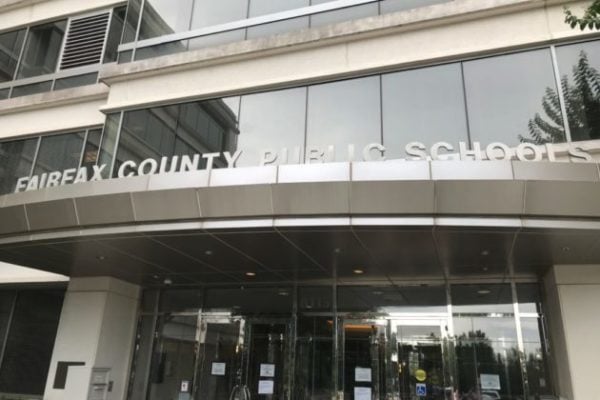
Fairfax County Public Schools Superintendent Scott Brabrand is asking for a $3.1 billion budget for the 2022 fiscal year that focuses “on the most pressing needs” of the school system.
He presented the nearly level-services budget — “a modest request” with an approximately $400,000 increase — to the county school board last Thursday (Jan. 7).
The proposed budget requests a $42.7 million increase in transfer funds from the county government to pay for new preschool special education classes, retirement rate increases, and rising health care costs, which would patch over a gap created by drops in county and state revenue due to the COVID-19 pandemic.
“As all of you know, the COVID-19 pandemic has impacted FCPS, our students, families, and staff in ways we couldn’t have imagined,” Brabrand said during the meeting. “I have designed a budget to meet the educational and social-emotional needs of our children so they can continue to learn and grow despite the challenges of the past year.”
The proposed budget includes money for distance learning, including cybersecurity protection and Zoom, which will replace Blackboard for web-conferencing, he said.
The budget does not contain compensation increases for most employees, though there is $3 million to finish a three-year initiative to increase the salaries of instructional assistants and public health training assistants.
In December, Virginia Gov. Ralph Northam outlined a state budget for schools that features a one-time, 2% bonus for teachers and support staff, with the potential for the salary boost to become permanent. But Brabrand said Fairfax County is opting out because it cannot afford to participate.
The burden would be on Fairfax County to match state funds with $32 million in county-level funding, he said.
“We understand that [FCPS] kept everybody whole,” Fairfax Education Association President Kimberly Adams said. “But many staff see it as a slap in their face.”
In comparison, Prince William County offered compensation increases in its budget last year , and Loudoun County’s proposed budget for the upcoming fiscal year includes money to cover compensations that were frozen last year, she said.
“If Loudoun and Prince William moved two steps ahead of Fairfax, we’re behind,” she said. “People are already irritated. This is a potential reason to leave.”
The lack of compensation particularly hurts Virginia teachers, who have the largest teacher wage penalty in the country at 32.7%, Fairfax County Federation of Teachers President Tina Williams said.
“We’re disappointed that the FCPS proposed budget does not include a pay increase for school employees, especially after a year that is the hardest in their career,” she said in a statement. “We urge FCPS to demonstrate it values the hard work and dedication of its employees by providing wage and cost of living adjustments to help keep employees whole.”
The Fairfax County School Board will hold a work session to discuss the proposed budget tomorrow (Tuesday). A public hearing has been scheduled for 6 p.m. on Jan. 26, though it could carry over to Jan. 27 if needed.
The school board will adopt its advertised budget on Feb. 18 and present it to the Board of Supervisors on April 13. A final approved budget is scheduled to be adopted on May 20.
Like other towns throughout the state and country, the Town of Herndon’s budget has been hit harder by the COVID-19 pandemic than counties as other larger municipalities.
But Jennie Tripoli, the town’s finance director, hopes things will “start to turn the corner” over the summer as vaccinations and warmer weather bring more normal conditions to the area.
At a recent Herndon Town Council meeting — the first session with newly-elected members and Mayor Sheila Olem — Tripoli said that the town had to sequester roughly $5.5 million in funding in fiscal year 2021. In the next fiscal year, the town hopes to transition from surviving to reviving itself.
The currently authorized budget for FY2021 is roughly $33.3 million, a figure that is short of projections by roughly $450,000. The town received $2.4 million in funding from the federal CARES Act.
But like other towns, Herndon was excluded from the latest round of federal funding.
The challenges posed by the pandemic are unique to the town. Unlike the county, the town relies heavily on excise taxes like the meals tax for funding.
The town took big hits in many sources of revenue. For example, revenues from fines and forfeitures decreased by 44 percent, when reductions of roughly 10 percent were originally anticipated. Similarly, fees from services for parks decreased by 91 percent instead of the original 56 percent decrease projected by staff.
As the town looks toward preparing the FY2022 budget, Tripoli cautioned that much is still uncertain about the budget, consumer habits, the path of the virus, and vaccinations.
So far, the county is expecting a three-percent increase in revenues from residential real estate taxes. However, a 10 percent decrease in non-residential retail and hotels, as well as local taxes like meals and transient occupancy, is still expected for the next fiscal year.
Fees from building inspections are also expected to normalize, she said.
“We’re still in unprecedented economic uncertainty,” she said, adding that the hope is “gradual recovery” begins in the summer of this year.
The town council is expected to hold additional work sessions on the budget later this month.
Image via Herndon Town Council
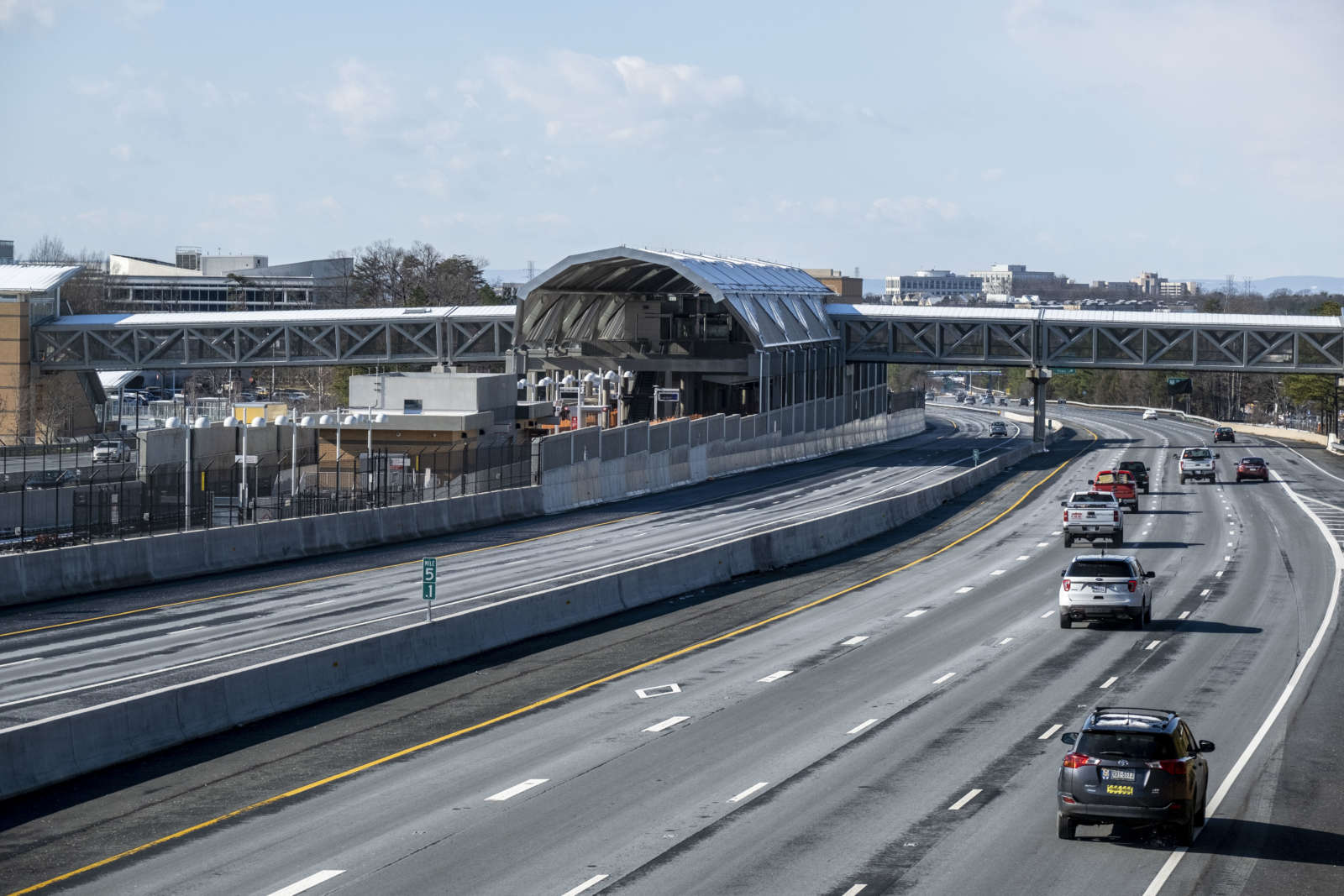
Metro is considering plans to eliminate weekend service as the system grapples with how to fill a nearly $500 million deficit.
The proposal, which the Washington Metropolitan Area Transit Authority board will hear on Friday, would also call for trains to run every half hour, shutter 19 stations and slash bus service levels.
According to the proposal, Metro would offer an “affordable bare-bones service network to sustain essential travel and support the region’s recovery.” Under the proposal, ridership would be reduced to around 45 percent of pre-pandemic levels. The system would also close at 9 p.m.
“We’re facing. obviously, a historic budget crisis. It started in (fiscal year) 21 and will continue in (fiscal year) 22,” Metro General Manager Paul Wiedefeld said.
But a federal coronavirus relief package that could include funding for public transit could change the otherwise grim outlook of the overall system. According to the American Public Transit Association, public transit needs $32 billion just to survive.
Metro was awarded $800 million from the CARES Act in May — funding that runs out early next year.
Nineteen stations with low ridership would close during the pandemic. Reopening would be determined based on the financial health of Metro. Weekday rail services would end two hours early at 9 p.m. Weekend service would be eliminated entirely and bus service would be slashed from 60 to 41 routes.
The proposal also calls on cutting 2,400 jobs in addition to workforce cuts already enacted this year.
The opening of additional Silver Line stations into Loudoun County will not be affected by the budget slashes, according to the presentation.
Metro’s fiscal year begins in July. Public hearings and outreach campaigns are planned until March.
 This is an opinion column by Del. Ken Plum (D), who represents Reston in Virginia’s House of Delegates. It does not reflect the opinion of Reston Now.
This is an opinion column by Del. Ken Plum (D), who represents Reston in Virginia’s House of Delegates. It does not reflect the opinion of Reston Now.
Until the early 1970s the Virginia General Assembly met every other year in the even-numbered years. For the very conservative state that it was, every other year was deemed adequate to limit the power of government. With all the changes that had occurred in the world with wars, growing and competitive economies among nations and states, and increased expectations from the citizenry particularly for more educational programs, Virginians approved a Constitutional amendment in 1971 that added a “short” session in the odd-numbered years, so called because it is 45 days in contrast to the regular session that is 60 days. In the 1980s another Constitutional amendment added a “reconvened” session each year after the regular session to deal with the governor’s amendments to legislation. This happened because the state became more competitive between the major political parties, and the party controlling the General Assembly could no longer be counted as controlling the governorship as well.
In any year, the governor has the constitutional power as does the General Assembly to call a “special” session to deal with unique needs. Although the regular “long” session held this year along with its reconvened session were considered among the most productive ever there was general agreement among political leadership and the active community at large that a special session would be needed. As the Commonwealth faced the devastation of an international pandemic, a crashing economy as great as the Great Depression, and social unrest that demanded that issues overlooked or delayed for decades had to be faced, a Special Session was called by the Governor.
In his proclamation of July 17, 2020 calling the General Assembly into Special Session, Governor Ralph Northam stated its objectives as being “for the purpose of adopting a budget based on the revised revenue forecast and consideration of legislation related to the emergency of COVID-19 and criminal and social justice reforms.” Never has a Special Session of the past had such broad intent with any one of the purposes being more than adequate to have the legislature’s attention.
The session is special also in that the General Assembly for the first time in its history is meeting virtually. The Senate has some social-distanced meetings at the Science Museum, but as a House member I meet almost daily in virtual meetings of committees on which I serve and every several days with the entire 100-member House. I have a single-purpose secure electronic device that permits me to cast my votes electronically.
The Special Session must grapple with a $2.7 billion shortfall in revenue as a result of the tanking of the economy. The Governor’s proposals that leave more than a billion dollars in a “rainy-day” fund require close scrutiny.
Finally, the most important “special” feature of this session is that issues related to fairness and safety in voting and police and criminal justice reform are being addressed. In a future column I will enumerate these special bills as they are passed by the House and Senate and signed by the Governor. I am proud to represent my constituents in such an historic and special Special Session!
File photo
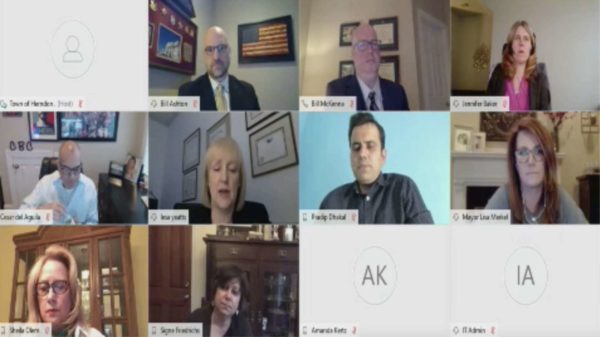
After revisions to its previous proposal, the Herndon Town Council formally adopted its budget for FY2021 this week.
The $61 million budget was scaled back to adapt to economic fluidity and uncertainty caused by the COVID-19 pandemic. The town’s taxes and fees, including real estate and meals taxes, remain changed. But the town’s recycling fee doubled from $8 per quarter to $16 per quarter.
Unlike previous budgets, the document includes $11.5 million in immediately sequestered funds, $5.5 million of which will be attributed to the town’s general fund. Overall, the FY2021 budget allocates $38.8 million for the general fund.
Sequestered funds can be spent if the town achieves its revenue targets through the fiscal year. But if revenues fall below projections, the town may need to consider reductions in personnel costs.
“While the adopted General Fund budget is $38.8 million, in practice it will be considered a $33.3 million budget,” said Mayor Lisa Merkel. “Sequestered funds may only be released if and when identified targets are met. This gives us latitude to adapt to the unstable and uncertain fiscal environment we are in. It also gives us the best chance to maintain our exceptional workforce.”
The adopted budget will be posted on the town’s website by July 1, the beginning of the new fiscal year.
Photo via Herndon Town Council/Zoom
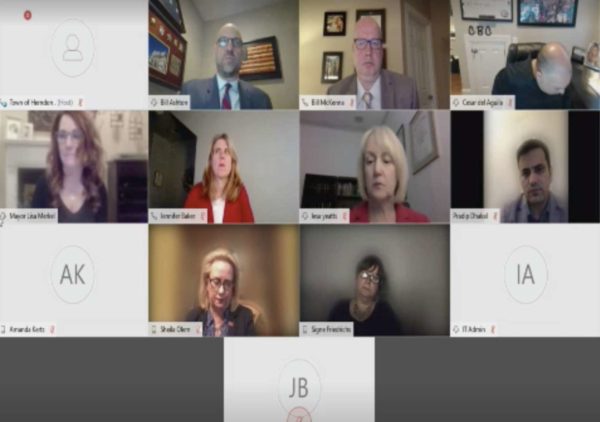
Prompted by the coronavirus pandemic, the Town of Herndon’s revised budget for the next fiscal year proposes a half-a-million-dollar cut from the original proposal.
The $38 million proposal eliminates a planned one-cent increase in the real estate tax, a projected increase of $100,000 in revenues from the Business, Professional ad Occupational License tax, and pay increases for town staff.
Herndon Town Manager Bill Ashton II is also calling on the Herndon Town Council to immediately sequester $5.5 million that can be spent when the town achieves revenues targets int he next fiscal year.
Overall, however, the budget is not materially different from the original proposal.
Ashton noted that the uncertain pace of economic recovery and lack of data on projected revenues creates an “extremely fluid” economic environment. If revenues fall below projections, the town will consider exploring reductions in personnel costs, the town’s largest spending category by far.
Here’s more from Ashton II on the updated plan:
“The shortcoming of this proposal is that it does not directly consider how significant changes to the economy will affect the town’s revenues moving into, and through, FY 2021. The problem with creating such a forecast is that we have limited data to support creating assumptions on which to build these projections. If we were to establish projections based on the small data sampling we have today, we would be forced into significant personnel reductions in this budget. Such reductions would cause the town to incur additional costs and would be difficult to unwind should the revenue situation materialize better than expected. “
He also noted that the town’s budgeting approach will keep the town from “over-committing in its response to a worst-case scenario,” allowing the town to adapt to a changing economic climate in the post-COVID-19 world.
A work session on the budget is set for May 5, followed by public hearings on May 12 and May 26. All meetings, which begin at 7 p.m., will be held online. In addition to comments at meetings, residents can submit comments online or by emailing [email protected].

The Town of Herndon’s proposed budget for next year is slated for major changes, according to Herndon Town Manager Bill Ashton.
At a Herndon Town Council meeting last night (Tuesday), Ashton said that town officials are closely monitoring current expenditures and revenues. The revised budget for fiscal year 2021 will be released on May 1.
“We are making some very dramatic changes to it,” Ashton said, adding that the town’s revenue streams are doing “a little better” than town staff originally projected.
The Herndon Town Council will review the budget at work sessions on May 5 and May 19, followed by public hearings on May 12 and May 26.
All sessions will be held online due to the ongoing COVID-19 public health emergency. The town will release more information on how to make live public comments during the public hearing. Residents can also submit comments on the proposed budget by emailing [email protected].
Image via Town of Herndon
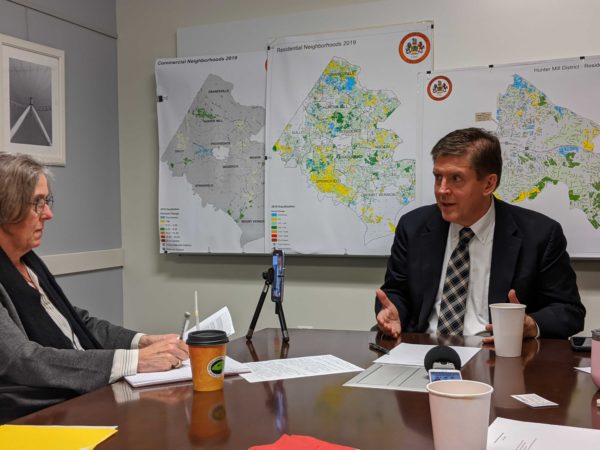
Hunter Mill District Supervisor Walter Alcorn plans to hold another virtual town hall on the proposed budget for the next fiscal year.
The budget town hall, which also took place earlier this month, is set for Friday (April 24) at 12:30 p.m.
In a newsletter, Alcorn stated that the “lunch tie discussion” will also feature Melanie Meren, the school board member for the Hunter Mill District, and Christina Jackson, director of the county’s Department and Budget.
Details on how to participate will be released soon.
The coronavirus pandemic has driven major changes in the proposed budget, including elimination of tax rate increases. The budget assumes that no net increase in the county’s revenues is expected.
As the coronavirus pandemic creates turmoil for the fiscal year 2021 budget considerations, Fairfax County Public Schools aims to mirror Fairfax County’s budget revision approach.
The Fairfax County School Board tackled changes to the FCPS budget during its meeting yesterday.
Marty Smith, the chief operating officer for FCPS, shared in a presentation that Superintendent Scott Brabrand is looking to mirror the reduction strategy being used for the county’s budget.
The presentation also noted that FCPS aims to maintain its existing staff, but will defer compensation increases to fiscal year 2022. Amendments and new strategic investments will also be pushed.
Extended Pay For Some Substitute Teachers
The school board also unanimously approved a motion that continues pay for part-time, temporary, hourly employees through April 24.
The motion applies to long-term substitute and does not include short-term substitute teachers.
The school board will reconsider pay for those employees when the superintendent provides more information to the board for the meeting on April 16.
At that upcoming meeting, the board will decide pay for the remainder of the school year.
“To Be Determined”
While FCPS is expecting several one time savings, many of the costs associated with the pandemic are still unknown.
So far, all of the financial amounts for categories, like social emotional supports and a COVID-19 second wave contingency plan, listed in FCPS’s “Post COVID-19 Response Plan” are “TBD,” according to the presentation.
Financial impacts related to unemployment and paid leave under the Families First Coronavirus Actare also unknown at this time.
FCPS may also face another, yet-to-be-determined impact: more students.
Brabrand said during the meeting that FCPS must prepare for a possible influx of students.
“It’s a job creation area and we have families in private school who may be financially impacted,” he said.
Image via FCPS/YouTube
Hunter Mill District Supervisor Walter Alcorn is hoping that more resources get allocated to small businesses as Fairfax County officials discuss the revised fiscal year 2021 budget.
Alcorn held a media call this morning (April 9) to discuss dramatic cuts and changes to the changed budget proposal, following a digital public hearing he held last night with residents.
“I’m not happy about the updated budget but it does reflect the reality we’re in right now,” Alcorn said during the media call.
The COVID-19 pandemic caused Fairfax County Executive Bryan Hill to revise suggestions for the upcoming budget, which were integrated into a draft and published on Tuesday (April 7).
Many of the changes include halting the expansion of new projects — focusing instead to retain projects already in progress, according to Alcorn.
“We are going to see some delays on some of our affordable housing projects,” Alcorn said, “It’s disappointing to me because doing more on affordable housing will help the same folks who are being impacted by the Covid emergency… These are some of the same folks who have been laid off.”
Other programs that will likely be delayed are the implementation of body cameras for police officers and a freeze in salary for Fairfax County employees.
“It really is an attempt to put the breaks on anything new,” he said.
Alcorn said he also wants to see relief programs for small businesses in Fairfax County, which may happen.
Next Tuesday, the Board of supervisors will discuss a micro-loan program for local business owners impacted by the pandemic, Alcorn said.
The Budget Committee spoke last week about the potential for the program to offer up roughly $1 million for small businesses, but Alcorn suggested this number was meant to be a “place holder” until there was an opportunity for further discussion.
The Fairfax County Board of Supervisors is set to vote on the final adjusted budget during the May 12 meeting, which was later than previously suggested in Fairfax County documents.
(Updated to remove information about the statutory deadline)
As the U.S. experiences an economic downturn as a result of COVID19, Town of Herndon officials plan to revise the previously proposed budget for fiscal year 2021.
Herndon Town Manager William Ashton II recently decided that the budget is no longer fitting for the town’s needs, according to a press release.
The budget will require “comprehensive changes” before a new draft is presented to the town council and public, the press release said.
To give everyone time to rethink the budget and make essential changes to the plan, Ashton suggested that required public hearings for the new budget be scheduled for May 12 and May 26, according to the press release.
“This gives staff time to adjust anticipated revenues, which are already significantly impacted by the pandemic,” Ashton said in the press release. “As a result, we expect comprehensive changes in our anticipated expenditures. Many of the assumptions in the current proposed budget are no longer valid.”
Typically, the town must adopt a budget prior to June 30, according to the press release, which added that the fiscal year typically begins on July 1.
Photo via Herndon Town Council/Facebook
Hunter Mill District Supervisor Walter Alcorn plans to hosta virtual town hall to communicate with local residents about changes to the proposed fiscal year 2021 budget.
“My staff and I are still working out the details to enable your participation,” Alcorn said in his newsletter yesterday. “I will get that information out to you as soon as it is available through this newsletter, as well as my social media accounts.”
Previously, Alcorn postponeda budget town hall that was set to happen in Vienna on March 21 due to the coronavirus. Holding the town hall virtually will limit the risk of spreading the virus.
The virtual town hall is tentatively scheduled for next Wednesday, April 8, at 7 p.m. — one day after the updated FY 2021 budget proposal is expected to go before the Fairfax County Board of Supervisors.
Currently, Fairfax County staff are revising the proposed budget, which was developed before the coronavirus pandemic hit the area, to address expected revenue losses and help small businesses.
Residents can expect opportunities to testify on the budget before the county board between April 14-16.
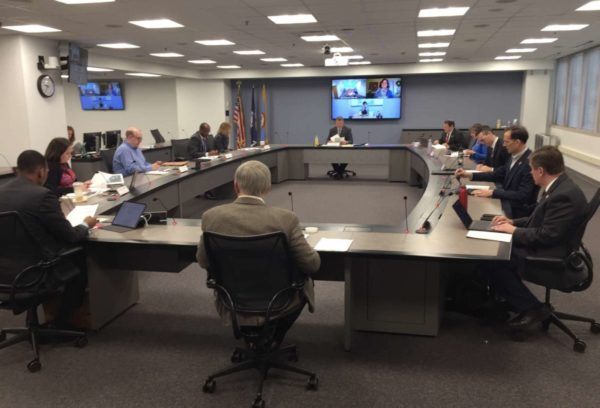
As the coronavirus outbreak continues to take a major hit on the economy, Fairfax County leaders are bracing for the impact of the outbreak on the upcoming county budget.
At a budget meeting today (Tuesday), county leaders said they plan to revisit the proposed fiscal year 2021 budget, which was developed before the coronavirus pandemic impacted the area. A revised proposal is expected to go before the Fairfax County Board of Supervisors by April 7.
The county is expected to take a hit from losses in the following categories: sales tax, transit occupancy tax, business permits, and licensing tax, personal property tax, and state revenue, among other categories. Over three months, a 25 percent dip in the local sales tax results in roughly $12.7 million in losses.
All agencies are tightening their belts and limiting spending for critical needs only.
This year, county officials hope to set aside $11.3 million to offer help to nonprofit organizations, local businesses, manage the COVID-19 crisis, and fund licensing for the shift to teleworking.
As of today, there are 245 confirmed cases of COVID-19 in the Fairfax Health District, which includes Fairfax County, the cities of Fairfax and Falls Church and towns in the county — leading all other jurisdictions in the state.
Support for Businesses and Nonprofits
In addition to federal assistance, a proposed $1 million fund administered through the Community Business Partnership could help small businesses struggling financially and at-risk of closing.
“Many of them are finding it very difficult to even survive right now,” Rebecca Moudry, the director of the county’s Fairfax County Department of Economic Initiatives, said.
The microloan program, if approved, would allow small businesses to apply for a maximum of $30,000 with an interest rate of 3.75 percent. To qualify for funds, businesses must have fewer than 50 employees, demonstrate financial hardship linked to COVID-19 and be based in the county.
Moudry said the program would ensure that local dollars “stay local,” but she cautioned that micro loans are simply a “drop in the bucket.”
Lee District Supervisor Rodney Lusk said that he wants to see the county diversify its commercial tax base.
“It’s imperative today as we look at the impact on small businesses,” he said at the meeting today.
Local nonprofit organizations are struggling to raise money and need help with services and support, according to Chris Leonard, the director of the county’s Department of Neighborhood and Community Services.
More individuals are calling the department for help with unemployment, low income and financial strife.
A recent survey of local nonprofit organizations found that most organizations are seeing more requests for food, health, hygiene and financial assistance, Leonard said. Youth programming and transportation are most likely to see major reductions.
He hopes to create a program to offer financial assistance and food for individuals most in need, targeted especially for local residents making 200 percent of the area median income. Support would be provided through the county’s existing network of community-based organizations.
County officials noted that the initiatives, programs and funding will shift as the COVID-19 outbreak continues to unfold.
“We’re going to have to evolve this as we go,” Lennard said.
Next Steps For the Budget
Once the revised budget is ready by April 7, residents can expect opportunities to testify April 14-16.
Joseph Mondoro, the county’s chief financial officer, said that the meeting today that people will be able to testify via video, phone, online forms and even in-person. Although Chairman Jeff McKay said that he would like people to only come in-person as a last resort.
McKay added that quarterly reviews, which the county already does, will will be “much more robust” for the FY 2021 budget.
Much of the discussion between the supervisors today involved ideas they had for where to cut or boost up the new budget, including suggestions from Mason District Supervisor Penny Gross to “keep first responders in mind” and Springfield District Supervisor Pat Herrity to delay funding the body camera program for the police department.
At the end of the meeting, McKay said there will be “shared pain” in the new budget, noting that cuts should not focus on one area.
McKay said that one of his top priorities is to keep on the county’s employees.
“We want to protect our employees,” he said.
Catherine Douglas Moran contributed to this report
Photo via Fairfax County Government
As Fairfax County officials adjust to digital meetings and remote work, Hunter Mill District Supervisor Walter Alcorn said he’s unsure how the COVID-19 pandemic might affect upcoming budget discussions.
Changes to the protocol called to attention a shifting reality for public officials, Alcorn told reporters during an online meeting on Wednesday (March 25).
“I think we are starting over for the FY2021 budget based on all the changes that have happened in the last few weeks,” he said.
Still, the county’s Budget Committee is going to be meeting virtually next Tuesday (March 31), according to Alcorn. The county executive is expected to present the proposed budget with updated numbers and assumptions based on COVID-19 responses, he said.
“That’s going to be a particularly important budget meeting,” he said. “I’m particularly interested to see what assumptions are going to go into revenues for next year.”
As of right now, the county executive suggested that roughly $11 million be set aside as an emergency fund for COVID-19 response, Alcorn said.
Though the dates and times are still up in the air, Alcorn said that the county will schedule a virtual town hall after next Tuesday.
As originally expected, he also said constituents can expect public hearings to be held in mid-April.
“If we are still in the situation we are in here, we’ll have to be a little bit more creative in terms of how we hear testimony and how the public can participate in that process,” he said, adding that the county staff is brainstorming solutions to this dilemma.


